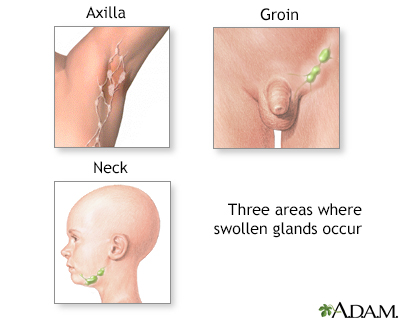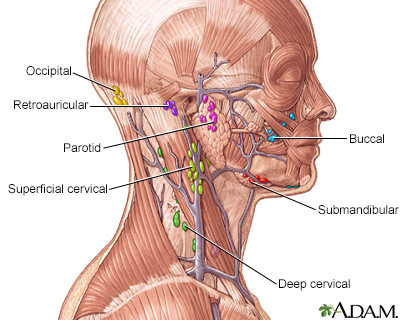Swollen lymph nodes
Swollen glands; Glands - swollen; Lymph nodes - swollen; Lymphadenopathy
Lymph nodes are present throughout your body. They are an important part of your immune system. Lymph nodes help your body recognize and fight germs, infections, and other foreign substances.
The term "swollen glands" refers to enlargement of one or more lymph nodes. The medical name for swollen lymph nodes is lymphadenopathy.
In a child, a lymph node is considered enlarged if it is more than 1 centimeter (0.4 inch) wide.

The lymphatic system filters fluid from around cells. It is an important part of the immune system. When people refer to swollen glands in the neck, they are usually referring to swollen lymph nodes. Common areas where lymph nodes can be easily felt, especially if they are enlarged, are the groin, armpits (axilla), above the clavicle (supraclavicular), in the neck (cervical), and the back of the head just above hairline (occipital).

Swollen lymph nodes, sore throat, fatigue and headache are some of the symptoms of mononucleosis, which is caused by the Epstein-Barr virus. It is generally self-limiting and most patients can recover in 4 to 6 weeks without medicines.

The lymphatic system is a complex system of fluid drainage and transport, and immune response and disease resistance. Fluid that is forced out of the bloodstream during normal circulation is filtered through lymph nodes to remove bacteria, abnormal cells and other matter. This fluid is then transported back into the bloodstream via the lymph vessels. Lymph only moves in one direction, toward the heart.

Lymph nodes produce immune cells to help fight infection. They also filter the lymph fluid and remove foreign material, such as bacteria and cancer cells. They can become swollen from inflammatory conditions, an abscess, cancer, and most commonly from infection. Common areas where lymph nodes can be felt include the groin, armpit, behind the ears, back of the head, sides of the neck and under the jaw and chin.

Lymph nodes play an important part in the body's defense against infection. Swelling might occur even if the infection is trivial or not apparent. Swelling of lymph nodes generally results from localized or systemic infection, abscess formation, or malignancy.

Lymph nodes play an important part in the body's defense against infection. Swelling might occur even if the infection is trivial or not apparent.
Considerations
Common areas where the lymph nodes can be felt (with the fingers) include:
- Groin
- Armpit
- Neck (there is a chain of lymph nodes on either side of the front of the neck, both sides of the neck, and down each side of the back of the neck)
- Under the jaw and chin
- Behind the ears
- On the back of the head
Causes
Infections are the most common cause of swollen lymph nodes. Infections that can cause them include:
- Abscessed or impacted tooth
- Ear infection
- Colds, flu, and other infections
- Swelling (inflammation) of gums (gingivitis)
- Mononucleosis
- Mouth sores
- Sexually transmitted illness (STI)
- Tonsillitis
- Tuberculosis
- Skin infections
Immune or autoimmune disorders that can cause swollen lymph nodes are:
Cancers that can cause swollen lymph nodes include:
Many other cancers may also cause swollen lymph nodes.
Certain medicines can cause swollen lymph nodes, including:
- Seizure medicines, such as phenytoin
- Typhoid immunization
Which lymph nodes are swollen depends on the cause and the body parts involved. Swollen lymph nodes that appear suddenly and are painful are usually due to injury or infection. Slow, painless swelling may be due to cancer or a tumor.
Home Care
Painful lymph nodes are generally a sign that your body is fighting an infection. The soreness usually goes away in a couple of days without treatment. The lymph node may not return to its normal size for several weeks.
When to Contact a Medical Professional
Contact your health care provider if:
- Your lymph nodes do not get smaller after several weeks or they continue to get larger.
- They are red and tender.
- They feel hard, irregular, or fixed in place.
- You have fever, night sweats, or unexplained weight loss.
- Any node in a child is larger than 1 centimeter (0.4 inch) in diameter.
What to Expect at Your Office Visit
Your provider will perform a physical examination and ask about your medical history and symptoms. Examples of questions that may be asked include:
- When the swelling began
- If the swelling came on suddenly
- Whether any lymph nodes are painful when pressed
The following tests may be done:
- Blood tests, including liver function tests, kidney function tests, and CBC with differential
- Lymph node biopsy
- Chest x-ray
- CT scan of the abdomen
Treatment depends on the cause of the swollen nodes.
References
Tower RL, Camitta BM. Lymphadenopathy. In: Kliegman RM, St. Geme JW, Blum NJ, Shah SS, Tasker RC, Wilson KM, eds. Nelson Textbook of Pediatrics. 21st ed. Philadelphia, PA: Elsevier; 2020:chap 517.
Winter JN. Approach to the patient with lymphadenopathy or splenomegaly. In: Goldman L, Cooney KA, eds. Goldman-Cecil Medicine. 27th ed. Philadelphia, PA: Elsevier; 2024:chap 154.
Version Info
Last reviewed on: 2/8/2024
Reviewed by: Linda J. Vorvick, MD, Clinical Professor, Department of Family Medicine, UW Medicine, School of Medicine, University of Washington, Seattle, WA. Also reviewed by David C. Dugdale, MD, Medical Director, Brenda Conaway, Editorial Director, and the A.D.A.M. Editorial team.
